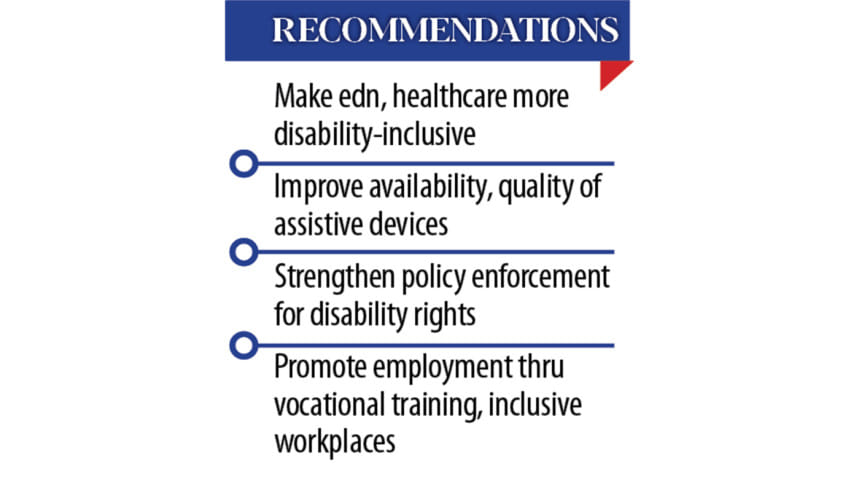Two-thirds with neuro disabilities lacked edn access

Around two-thirds of the individuals with neurodevelopmental disabilities said they had no access to education, according to a new study.
A total of 414 individuals took part in the survey.
Access to employment for these individuals with special needs was found to be even lower -- 84 percent of participants aged 18 and above reported having no access to work.
The survey was jointly conducted by BRAC James P Grant School of Public Health and Apasen International, a UK-based charity organisation.
Findings from the study, titled "Health, Education and Employment of Persons with Neurodevelopmental Disabilities in Bangladesh", were shared at a programme held at a Dhaka hotel yesterday.
Prof Tanvir Hasan, head of the research team, and Limia Dewan, technical adviser, said the survey included 414 persons with neurodevelopmental disabilities from 33 districts.
The participants included people with autism spectrum disorder, intellectual disability, cerebral palsy, and Down syndrome.
The researchers also conducted in-depth interviews with 37 individuals, including carers and caregivers, and reviewed 49 policy documents.
According to the study, 157 participants (around 38 percent) had ever been enrolled in school at any point in their lifetime, with most reaching only the preschool or primary levels.
Of those, around 61 percent were male. Most of them (69 percent) attended mainstream schools that didn't have specialised support.
Around 20 percent went to special schools, while only 8.71 percent reported having access to a special educational plan at their schools, shows the study.
Among the 278 participants aged 18 and above, only 16.48 percent had reported engaging in any kind of work during their lifetime.
Of those employed, 88.71 percent were male and 11.29 percent female. The most common occupation was day labour (41 percent).
About 33 percent of participants reported having coexisting health conditions, the most common being gastrointestinal issues, followed by epilepsy and asthma.
Among them, a total of 73 participants had sought healthcare services they raised concerns about the quality of care, citing short consultation times and negative attitudes from healthcare providers.
The survey also found that only 11 percent of participants used assistive devices such as spectacles, hearing aids, walking sticks, wheelchairs, and prosthetics.
The study made several sector-wise recommendations, including the need to make healthcare, education, and training infrastructure more accessible for persons with disabilities.
It also called for a comprehensive, rights-based approach involving stronger policy enforcement, cross-sector collaboration, and community engagement.
Speaking at the event, Social Welfare Adviser Sharmeen Murshid stressed the need to expand the resource pool, citing a severe lack of skilled manpower in the sector.
She also called for stronger collaboration among organisations working with people with disabilities.
Rasheda K Choudhury, executive director of CAMPE; Prof Mushtaque Chowdhury, senior adviser to James P Grant School; and Mahmud Hasan, chief executive of Apasen UK and Apasen International, also spoke at the programme, among others.
Several persons with neurodevelopmental disabilities also shared their experiences at the programme, which was moderated by Bulbul Hasan, head of communication and policy at Apasen UK and Apasen International.

 For all latest news, follow The Daily Star's Google News channel.
For all latest news, follow The Daily Star's Google News channel. 



Comments